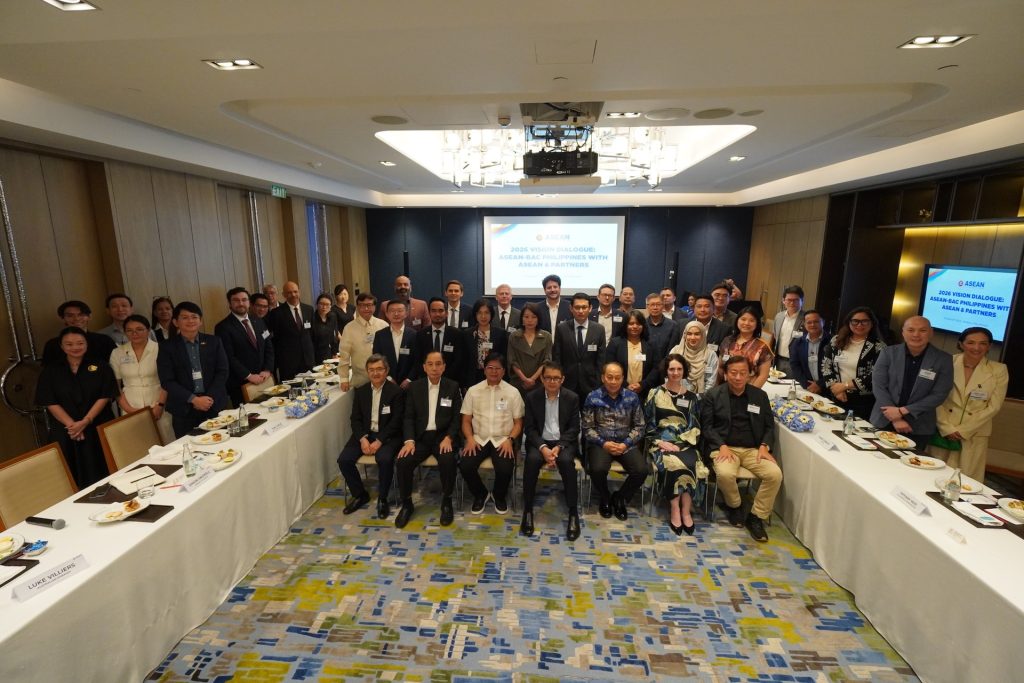
Mega-Sized Entrepreneurship Dreams at Go Negosyo 3M on Wheels Event
August 17, 2025
Iconic
August 25, 2025
A Chance to Help Shape the Region’s Future
It was a jampacked room at the Grand Hyatt Manila last week. Heads of the diplomatic missions from the ASEAN member-states were there: Brunei Darussalam, Cambodia, Indonesia, Malaysia, Myanmar, Viet Nam, Singapore and Thailand; as well as the heads of missions of dialogue partner-countries Australia, the United Kingdom, Canada, China, India, New Zealand, Russia and the United States. Joining them were the leaders of 12 of the Philippines’ biggest agribusiness companies. Later that day, I met with the president of the US-ASEAN Business Council following a reception organized by the US embassy to welcome their visiting business delegation.
The order of the day was how we can work toward inclusive growth through regional cooperation. I know I’m not alone in feeling exhausted from hearing these big words over and over, at the same time scratching my head over where all this high-level discussion is headed. I have said it often enough publicly to make my opinion unequivocal: we need to go beyond talking and truly focus on making all these efforts felt by those at the bottom of the pyramid.
In the ASEAN region, four out of the 10 member-states have as many as a quarter of their citizens still living in poverty; on the other end of the scale, you have super-rich countries where poverty is nearly nonexistent. The region is expected to be one of the fastest-growing in the world, yet we must not settle for lopsided growth. For prosperity to be sustainable, it has to be inclusive.
The meetings I mentioned above were convened so that we in the ASEAN Business Advisory Council (ASEAN-BAC) Philippines could share our vision for when we assume chairmanship in 2026. ASEAN BAC is the private sector body tasked to guide the region’s governments on policies towards economic integration. Next year will be a landmark year since it will have been 25 years since the ASEAN-BAC was established.The ASEAN-BAC Philippines, being the chair for the year, has decided on MSME development and food security and agriculture as its focus areas. Why these two areas? Because it is where we can achieve the most impact. Across the region, almost all of the enterprises are MSMEs, and they generate more than half the jobs. The poorest of our populations can be found in the agriculture sector despite food security becoming an increasingly paramount concern.
More than 50 years ago, we already united the ASEAN countries and successfully worked together through various issues. And with the support of our Dialogue Partner-countries, we can scale capacity-building, invest in critical cross-border infrastructure, promote broader access to capital and markets, as well as share technologies and best practices. At my meeting with the USABC, the American private sector representative said they would encourage US companies to explore partnerships in smart farming and agri-tech. From our dialogue partners during the meeting, we gathered that India and Australia can share their advances in agri-tech, Russia can explore partnerships in fertilizer, South Korea its cold-chain technologies, and so on. The possibilities are indeed exciting.
In both agriculture and MSME development, we can apply the “big-brother” framework to achieve our goals. Some of the most successful big-brother mentoring relationships have integrated MSMEs into their value chain. In agriculture, big companies can share their knowledge and resources and act as mentors to help improve the lives of small farmers. Our goal must not only be for agriculture to be sustainable, but also profitable, especially for small farmers.
Scaling it up to the regional level, the big brothers from each country can share their knowledge. This is the essence of our planned legacy project for the 2026 chairmanship, the ASEAN Food Security Alliance (AFSA).Under the ASEAN-BAC, each country initiates a legacy project upon assuming the chair. At our last chairmanship in 2017, it was the ASEAN Mentorship for Entrepreneurs Network (AMEN), the scaled-up version of our very own Kapatid Mentor ME program, which we conduct together with the Department of Trade and Industry. To date, AMEN has successfully created a regional network of entrepreneurship mentors and provided formal training to hundreds of SMEs from all ASEAN member-states. It is proof of concept that a successful local program can be scaled to a regional level.
Like AMEN, AFSA’s seed comes from our very own Kapatid Angat Lahat sa Agri Program, which aimed, among other things, to integrate small farmers into the value chain of large agri corporations. When we tried to see if we could scale KALAP to a regional level, we were able to successfully facilitate collaborative engagements between agribusiness companies from the Philippines, Malaysia, Indonesia, Brunei, Thailand and Cambodia. One successful venture is between a Philippine and a Malaysian company in the production of durian.
The Philippines’ chairmanship of ASEAN in 2026 is an opportune time for the private sector, ASEAN member-states and dialogue partners to help shape the region’s future through collaboration. There are several entry points for such collaborations, such as the grand events like the ASEAN Business Investment Summit, the ASEAN Business Awards and the Leaders’ and Dialogue Partners Meetings with business. Knowledge partners can also participate through contributions to policy papers.
The flagship projects we have planned for 2026 are also opportunities for collaboration. In addition to AFSA, they include an online Learning Management System designed for ASEAN entrepreneurs, initiatives on the digital economy and planned regional centers for excellence to be headquartered in the Philippines: the ASEAN Center for MSME Development, the ASEAN Center for Creative Industries and the ASEAN Center for Gender Equality and Women Empowerment.
I’ve been told it’s a bit early for 2026. I say, it’s never too early to start planning.
Originally Published in Philippine Star


2/F RFM Corporate Center, Pioneer cor. Sheridan Sts. Mandaluyong City, Metro Manila, Philippines

